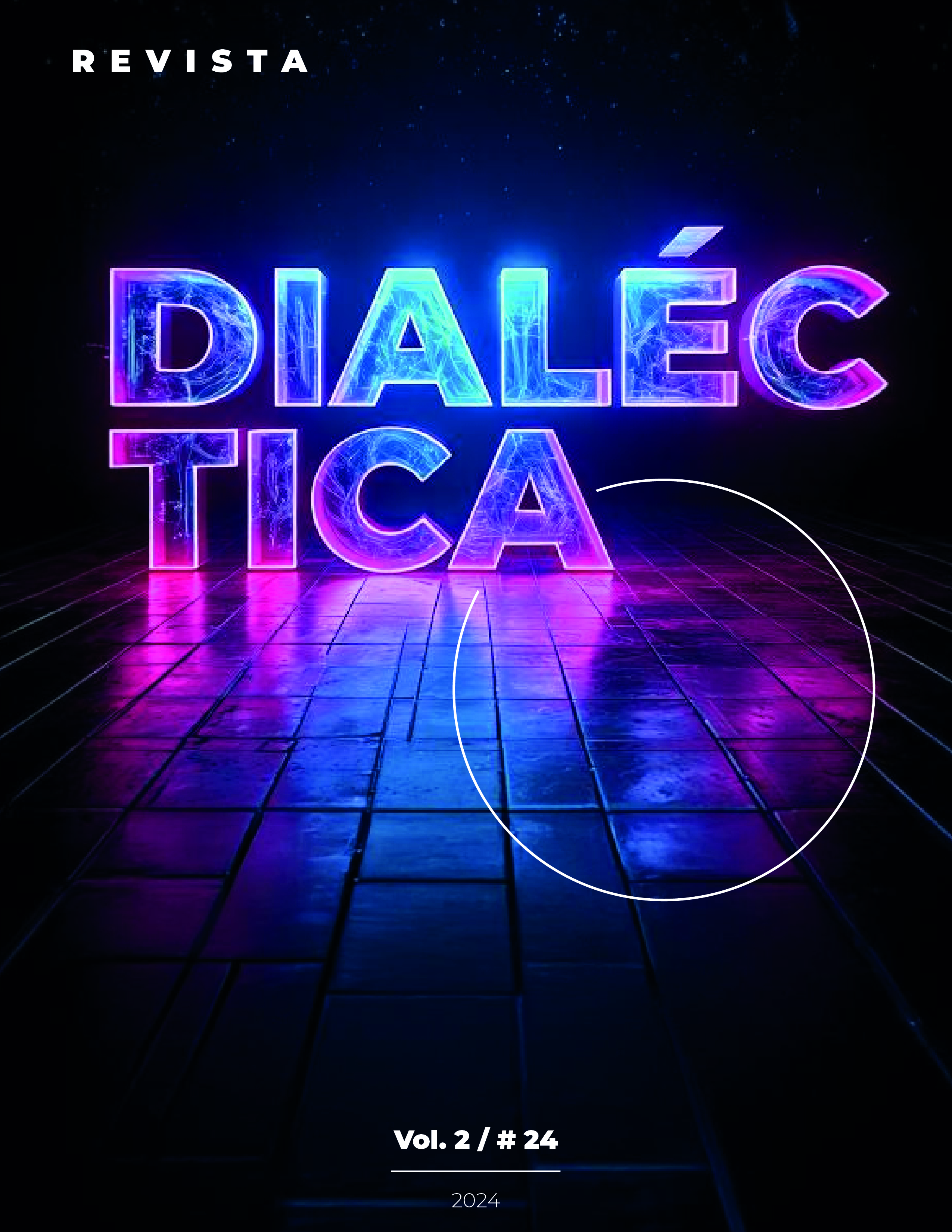BIENESTAR DOCENTE EN EL CONTEXTO GLOBAL: UN ESTUDIO BIBLIOMÉTRICO DE LA PRODUCCIÓN CIENTÍFICA.
DOI:
https://doi.org/10.56219/dialctica.v2i24.3491Keywords:
teacher well-being, bibliometric analysis, educational quality, scientific productionAbstract
Este estudio bibliométrico explora la producción científica sobre el bienestar docente en un contexto global, utilizando la base de datos Scopus y abarcando publicaciones desde 2000 hasta 2024. Se seleccionaron 736 documentos después de aplicar filtros de exclusión para asegurar la relevancia y calidad del análisis. La metodología empleada incluyó el uso del software R (V. 4.4.0) y la librería Bibliometrix para generar estadísticas descriptivas y visualizaciones que ilustran las tendencias y patrones en la investigación sobre bienestar docente. Los resultados muestran un aumento significativo en las publicaciones desde 2002, con un crecimiento exponencial en años recientes, alcanzando un máximo en 2023 con 182 artículos publicados. Estados Unidos se destaca como el país con mayor producción científica en este campo, con 146 artículos, seguido por China y Australia. El análisis también identifica el artículo más citado, escrito por Marjolein Zee y Helma Koomen en 2016, que examina el impacto de la autoeficacia docente en los procesos del aula y el bienestar psicológico de los docentes, subrayando los estudios más influyentes en este campo. Además, se destacaron áreas emergentes de investigación y se enfatizó la necesidad de mayor colaboración internacional para enriquecer la diversidad de enfoques y abordar cuestiones globales sobre el bienestar docente; confirmándolo como un campo de investigación en crecimiento, con implicaciones significativas para la calidad educativa y la formulación de políticas y programas de apoyo que mejoren el bienestar de los docentes a nivel mundial.
Downloads
References
Afolabi, F., Adenegan, K. y Adenegan, J. (2021). The Effect of Teachers’ Welfare on Job Performance in Public Secondary Schools in Ondo State, Nigeria in the Recession Period. International Journal of Social and Humanities Extension, 1(1), 14-19. https://ijshe.info/index.php/ijshe/article/view/4
Brackett, M.A., Palomera, R., Mojsa-Kaja, J., Reyes, M.R. and Salovey, P. (2010), Emotion-regulation ability, burnout, and job satisfaction among British secondary-school teachers. Psychol. Schs., 47: 406-417. https://doi.org/10.1002/pits.20478 DOI: https://doi.org/10.1002/pits.20478
Borjas, M., Gómez, I., Bejarano, M., y Rodríguez, J. (2019). Bienestar docente y competencias de la profesión de la docencia. Opción, 35(89-2), 1023-1051. https://produccioncientificaluz.org/index.php/opcion/article/view/27517
Cáceres, M., Gómez, L. y Zúñiga, M. (2018). El papel del docente en la evaluación del aprendizaje. Revista Conrado, 14(63), 196-207. http://conrado.ucf.edu.cu/index.php/conrado
Cardona, G. (2023). Representaciones sociales de ocio desde las subjetividades educativas para el bienestar escolar en educación básica secundaria y media. [Tesis doctoral, Universidad Metropolitana de Educación, Ciencia y Tecnología].
Charria, V., Romero, M., & Sarsosa, K. (2022). Well-being at work and working conditions in primary and secondary school teachers. Revista CES Psicologia, 15(3), 63-80. https://doi.org/10.21615/cesp.5984 DOI: https://doi.org/10.21615/cesp.5984
Diliberti, M. K., & Schwartz, H. L. (2023). Educator turnover has markedly increased, but districts have taken actions to boost teacher ranks: Selected findings from the sixth American School District Panel Survey. Santa Monica, CA: RAND Corporation. https://www.rand.org/pubs/research_reports/RRA956-14.html
Donthu, N., Kumar, S., Mukherjee, D., Pandey, N., & Lim, W. M. (2021). How to conduct a bibliometric analysis: An overview and guidelines. Journal of Business Research, 133, 285–296. https://doi.org/10.1016/J.JBUSRES.2021.04.070 DOI: https://doi.org/10.1016/j.jbusres.2021.04.070
Dusdal, J., & Powell, J. J. W. (2021). Benefits, motivations, and challenges of international collaborative research: A sociology of science case study. Science & Public Policy, 48(2), 235–245. https://doi.org/10.1093/scipol/scab010 DOI: https://doi.org/10.1093/scipol/scab010
Evers, W. J. G., Tomic, W., & Brouwers, A. (2004). Burnout among teachers: Students’ and teachers’ perceptions compared. School Psychology International, 25(2), 131–148. https://doi.org/10.1177/0143034304043670 DOI: https://doi.org/10.1177/0143034304043670
Fatria, M., Corrina, F., & Zulammar, Z. (2022). The importance of teacher welfare improvement. Jurnal Manajemen Dan Bisnis, 11(2), 313-320 https://doi.org/10.34006/jmbi.v11i2.519 DOI: https://doi.org/10.34006/jmbi.v11i2.519
Frances, N., Denis, S., & Vincent, O. (2016). The interplay of school welfare provision and teacher performance: The case of Ugandan secondary schools. International Journal of Educational Policy Research and Review, 3(1), 6-13. https://doi.org/10.15739/IJEPRR.16.002
García, E., & Weiss, E. (2019). U.S. schools struggle to hire and retain teachers: The second report in ‘The Perfect Storm in the Teacher Labor Market’ series. Economic Policy Institute. https://www.epi.org/publication/u-s-schools-struggle-to-hire-and-retain-teachers-the-second-report-in-the-perfect-storm-in-the-teacher-labor-market-series/
García, C. (2011). Condiciones de trabajo y salud de docentes de instituciones educativas distritales de la localidad uno (i) de Usaquén. Bogotá, 2010. [Tesis de maestría, Universidad Nacional de Colombia]. Archivo digital.
Hastings, R. P., & Bham, M. S. (2003). The relationship between student behaviour patterns and teacher burnout. School Psychology International, 24(1), 115–127. https://doi.org/10.1177/0143034303024001905 DOI: https://doi.org/10.1177/0143034303024001905
Hobson, A. J., Ashby, P., Malderez, A., & Tomlinson, P. D. (2009). Mentoring beginning teachers: What we know and what we don’t. Teaching and Teacher Education, 25(1), 207–216. https://doi.org/10.1016/j.tate.2008.09.001 DOI: https://doi.org/10.1016/j.tate.2008.09.001
Hué, C. (2012). Bienestar docente y pensamiento emocional. Revista Fuentes, 12, 47-68. https://idus.us.es/bitstream/handle/11441/32947/Bienestar%20docente %20y%20pensamiento%20emocional.pdf?sequence=1&isAllowed=y
Jamilah, N., Oktafia, R., & Ruchana, S. (2020). Influence of Welfare Against Teacher Performance. Proceedings of The ICECRS, 7, 1. https://doi.org/10.21070/icecrs2020368 DOI: https://doi.org/10.21070/icecrs2020368
Kinman, G., Wray, S., & Strange, C. (2011). Emotional labour, burnout and job satisfaction in UK teachers: the role of workplace social support. Educational Psychology, 31(7), 843–856. https://doi.org/10.1080/01443410.2011.608650 DOI: https://doi.org/10.1080/01443410.2011.608650
Klassen, R. M., & Chiu, M. M. (2010). Effects on teachers’ self-efficacy and job satisfaction: Teacher gender, years of experience, and job stress. Journal of Educational Psychology, 102(3), 741–756. https://doi.org/10.1037/a0019237 DOI: https://doi.org/10.1037/a0019237
Kyriacou, C. (2001). Teacher stress: Directions for future research. Educational Review, 53(1), 27–35. https://doi.org/10.1080/00131910120033628 DOI: https://doi.org/10.1080/00131910124115
Maba, W., Perdata, I. B. K., & Astawa, I. N. (2017). Constructing Assessment Instrument Models for Teacher’s Performance, Welfare and Education Quality. International Journal of Social Sciences and Humanities (IJSSH), 1(3), 88-96. https://doi.org/10.21744/ijssh.v1i3.59 DOI: https://doi.org/10.29332/ijssh.v1n3.59
Mujuni, P. M. B., Mwesigye, A. R., & Kazooba, C. T. (2022). The interaction effect between teachers’ welfare and human capital on Performance of Government Aided Primary Schools in Isingiro district, Uganda. European Journal of Human Resource, 6(1)32-51. https://doi.org/10.47672/ejh.1060 DOI: https://doi.org/10.47672/ejh.1060
Muñoz, A. (2017). El análisis bibliométrico como herramienta de medición de la producción y repercusión de las publicaciones científicas. En Páramo, P. La recolección de información en Ciencias Sociales. Una aproximación integradora. (pp. 313-336). Lemoine Editores
Murwaningsih, T., & Fauziah, M. (2023). The influence of professional attitude, welfare, self-sustaining development, and job satisfaction on teacher performance. Journal of Education and Learning (EduLearn), 17(2), 32-51. https://doi.org/10.11591/edulearn.v17i2.20785 DOI: https://doi.org/10.11591/edulearn.v17i2.20785
Na’imah, T., Kasanah, R., & Rahmasari Qurrota Aeni, P. S. (2021). Systematic Review on The Factors That Influence Well-Being Among Teachers. Sains Humanika, 13(2–3), 61-66. https://doi.org/10.11113/sh.v13n2-3.1917 DOI: https://doi.org/10.11113/sh.v13n2-3.1917
Naluwemba, F., Sekiwu, D., & Okwenje, V. (2016). The interplay of school welfare provision and teacher performance: The case of Ugandan secondary schools. International Journal of Educational Policy Research and Review, 3(1), 6-13. https://files.eric.ed.gov/fulltext/ED578105.pdf
Pranckutė, R. (2021). Web of Science (WoS) and Scopus: The Titans of Bibliographic Information in Today’s Academic World. Publications, Vol. 9, Page 12, 9(1), 12. https://doi.org/10.3390/PUBLICATIONS9010012 DOI: https://doi.org/10.3390/publications9010012
Publmed. (2021). Research collaborations bring big rewards: the world needs more. Nature, 594(7863), 301–302. https://doi.org/10.1038/d41586-021-01581-z DOI: https://doi.org/10.1038/d41586-021-01581-z
Ruiz, A., Ledgard, N., Parra, A., Rodríguez, C. y Vera, J. (2021). Bienestar personal, eficacia y apoyo directivo y su relación con el clima y violencia escolar en docentes de preescolares. En In book: Violência, Gênero e Populações Vulneráveis (349-362) Publisher: Editora UCDB - Universidade Católica Dom Bosco, Brasil. https://www.researchgate.net/publication/354904371_Bienestar_Personal_Eficacia_y_Apoyo_Directivo_y_su_Relacion_con_el_Clima_y_Violencia_Escolar_en_Docentes_de_Preescolares
Skaalvik, E. M., & Skaalvik, S. (2017). “Motivated for teaching? Associations with school goal structure, teacher self-efficacy, job satisfaction, and emotional exhaustion.” Teaching and Teacher Education, 67, 152-160. https://doi.org/10.1016/j.tate.2017.06.006 DOI: https://doi.org/10.1016/j.tate.2017.06.006
Springer, M. G., & Nguyen, T. D. (2019). Reviewing the evidence on teacher attrition and retention. Brookings. https://www.brookings.edu/articles/reviewing-the-evidence-on-teacher-attrition-and-retention/
Taie, S., & Lewis, L. (2023). Teacher Attrition and Mobility. Results From the 2021–22 Teacher Follow-up Survey to the National Teacher and Principal Survey (NCES 2024-039). U.S. Department of Education. Washington, DC: National Center for Education Statistics. Retrieved [date] from https://nces.ed.gov/pubsearch/pubsinfo.asp?pubid=2024039.
Toney, A., & Flagg, M. (2021). Research impact, research output, and the role of international collaboration. Center for Security and Emerging Technology; CSET. https://doi.org/10.51593/20210050 DOI: https://doi.org/10.51593/20210050
Trust, T. & Whalen, J. (2020). Should Teachers be Trained in Emergency Remote Teaching? Lessons Learned from the COVID-19 Pandemic. Journal of Technology and Teacher Education, 28(2), 189-199. Waynesville, NC USA: Society for Information Technology & Teacher Education. https://www.learntechlib.org/primary/p/215995/.
UNESCO & International Task Force on Teachers for Education 2030. (2024). Global Report on Teachers: Addressing teacher shortages and transforming the profession. Paris: UNESCO. https://unesdoc.unesco.org/ark:/48223/ pf0000388832
Villa, A. (2021). Propuesta para el fortalecimiento de las competencias socioemocionales en docentes y directivos de una institución educativa por medio de coaching y facilitación. [Tesis de maestría, Universidad Tecnológica de Pereira]. Archivo digital. https://repositorio.utp.edu.co/server/api/core/bitstreams/e86853c8-122e-40c9-bd0d-1e57f02b8adf/content
Weerason, S., Tesaputa, K., & Phuetsing, A. (2021). Developing the Program to Strengthen Working Achievement Motivation Competencies of Welfare School’s Teachers. International Education Studies, 14(11), 75-80. https://doi.org/10.5539/ies.v14n11p75 DOI: https://doi.org/10.5539/ies.v14n11p75
Zee, M., & Koomen, H. M. Y. (2016). Teacher self-efficacy and its effects on classroom processes, student academic adjustment, and teacher well-being: A synthesis of 40 years of research. Review of Educational Research, 86(4), 981–1015. https://doi.org/10.3102/0034654315626801 DOI: https://doi.org/10.3102/0034654315626801
Downloads
Published
How to Cite
Issue
Section
License
Copyright (c) 2025 DIALÉCTICA

This work is licensed under a Creative Commons Attribution-NonCommercial-ShareAlike 4.0 International License.
La revista Dialéctica conserva los derechos patrimoniales (copyright) de las obras publicadas, que favorece y permite la reutilización de los mismos bajo la licencia Creative Commons Atribución-NoComercial-CompartirIgual 4.0 , por lo cual se pueden copiar, usar, difundir, transmitir y exponer públicamente, siempre que se cite la autoría y fuente original de su publicación (revista, editorial, URL y DOI de la obra), no se usen para fines comerciales u onerosos y se mencione la existencia y especificaciones de esta licencia de uso. Si remezcla, transforma o crea a partir del material, debe distribuir su contribución bajo la misma licencia del original.












